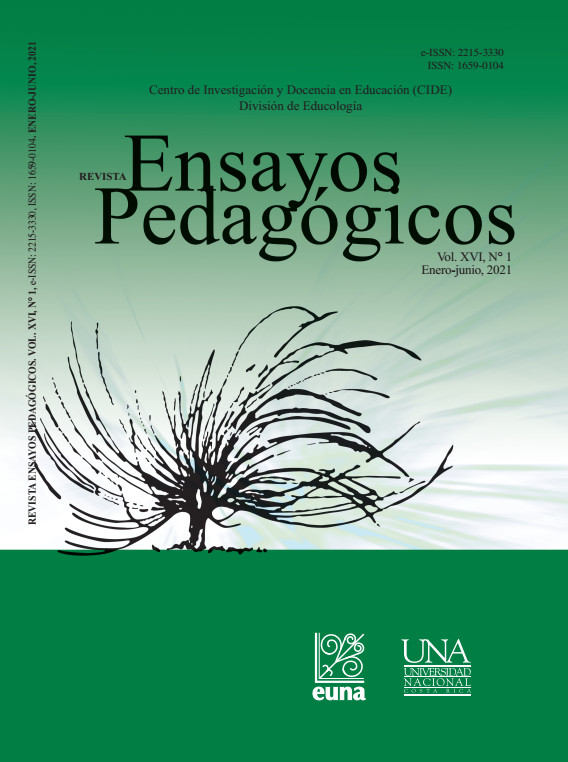Rediscovering Paulo Freire's Pedagogy of Hope
DOI:
https://doi.org/10.15359/rep.16-1.5Keywords:
education, hope, learning, pedagogy, teachingAbstract
This essay rediscovers an important work of the Latin American thinker Paulo Freire called Pedagogy of Hope: Reliving Pedagogy of the Oppressed that he published in 1992. After having been subject to intense ideological and political persecution in his country of origin Brazil and in exile, Paulo Freire, with a full maturity granted by years and experience, redefines in the Pedagogy of Hope, the principles of his Pedagogy of the Oppressed, being a faithful witness of the praxis aimed at the emancipation of the oppressed and of the oppressor. This essay recounts, in a contemporary framework, the main reflections evoked by Freire with the hope of rehabilitating in the educational act, and its essential role as an engine of change, a disregard of the truth, which is an indispensable resource towards the search for social justice.
References
Aullón, P. (2016). Ideas de la literatura y teoría de los géneros literarios. España: Ediciones Universidad de Salamanca.
Barrientos, P. (2018). Modelo educativo y desafíos en la formación docente. Revista Horizonte de la Ciencia, 8(15), 175-191. Recuperado de http://revistas.uncp.edu.pe/index.php/horizontedelaciencia/article/view/275/289
Feldfeber, M. y Andrade, D. (2016). Políticas educativas en América Latina en el siglo XXI. Balance y perspectivas. Revista Dossier, 39, 7-10. Recuperado de http://revistascientificas.filo.uba.ar/index.php/iice/article/download/3994/3580
Freire, P. (2005). Pedagogía de la esperanza. México: Siglo Veintiuno Editores.
Freire, P. (2006). Pedagogía de la autonomía: saberes necesarios para la práctica educativa. México: Siglo Veintiuno Editores.
Heeren, M. (2019). Problematización epistémica de la pedagogía: Algunas definiciones y aproximaciones. REIDOCREA, 8, 133-141. Recuperado de https://digibug.ugr.es/handle/10481/57748
Hernández, G. (2016). Globalización y posmodernidad: Elementos imprescindibles para la reflexión política. Revista STATUS, 1(1), 61-75. Recuperado de http://revista-status.uanl.mx/index.php/status/article/view/7/7
Matías, A. y Fernández, O. (2018). Desafíos epistemológicos de la educación superior en el siglo XXI. Revista Cadernos de Pesquisa, 25(1), 11-22. doi: http://dx.doi.org/10.18764/2178-2229.v25n1p11-22
Mujica, F. (2019). Análisis crítico del currículo escolar en Chile en función de la justicia social. Revista Educare, 24(1), 1-14. doi: http://doi.org/10.15359/ree.24-1.25
Ocampo, J. (2008). Paulo Freire y la pedagogía del oprimido. Revista Historia de la Educación Latinoamericana, 1(10), 57-72. Recuperado de https://revistas.uptc.edu.co/index.php/historia_educacion_latinamerican/article/view/1486/1482
Orozco, V. y Perochena, P. (2016). Trabajo por proyectos. Cambio metodológico para el protagonismo del estudiante en Educación Infantil (2-3 años). Revista de Estudios y Experiencias en Educación, 15(29), 151-164. Recuperado de https://dialnet.unirioja.es/servlet/articulo?codigo=5738273
Patiño, A. (2020). El Currículum oculto en la educación universitaria: Un estudio de caso en la Universidad de Panamá. Revista Acción y Reflexión Educativa, 45, 60-85. Recuperado de https://revistas.up.ac.pa/index.php/accion_reflexion_educativa/article/view/1142/955
Sanz, F. (1998). Significado histórico de Paulo Freire. Revista Interuniversitaria de Formación del Profesorado, 1(33), 53-59. Recuperado de https://dialnet.unirioja.es/servlet/articulo?codigo=117992
Published
How to Cite
Issue
Section
License
Ensayos Pedagógicos is subscribed to the Attribution-NonCommertial-NoDerivatives 4.0 International Creative Commons Licence, which allows both authors and readers to freely download, store, copy, and distribute the final approved publisehd version of the manuscript (post-print) as long as this is done without commercial purposes, no derivative works are generated, and the source and author are mentioned. As well, Ensayos Pedagógicos declares that authors will remain the rightful owners of the copyrights of their work in perpetuity.







